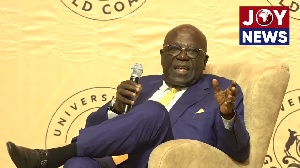Africa News of Friday, 4 April 2025
Source: www.ghanawebbers.com
South Africa not planning to retaliate over Trump’s tariffs
South Africa has decided not to retaliate against the United States following the imposition of new tariffs. Instead, the country plans to negotiate for exemptions and quota agreements, according to senior government officials on Friday.
This comes after President Donald Trump announced a 31% tariff on South African imports on Wednesday, alongside a 10% baseline tariff on all imports. Higher tariffs were also targeted at several countries.
South Africa, which is the U.S.'s second-largest trading partner in Africa after China, had aimed to secure a bilateral trade deal with the U.S. However, this goal has been complicated by Trump's ongoing criticism of the country since January.
Trade Minister Parks Tau emphasized that imposing retaliatory tariffs would be counterproductive. He expressed a desire to better understand how the U.S. arrived at the 31% rate, noting that South Africa’s average import tariff is currently 7.6%.
Foreign Affairs Minister Ronald Lamola remarked that Trump's new tariffs undermine the benefits of the African Growth and Opportunity Act (AGOA), which grants duty-free access to U.S. markets for qualifying African nations. AGOA is set to expire in September, and the new tariffs make the renewal of the trade agreement unlikely.
Ministers stressed the importance of diversifying South Africa’s export markets, particularly toward opportunities in Asia and the Middle East. To mitigate the impact of the tariffs, the government will provide support to affected industries such as car manufacturing, agriculture, processed foods, and metals. Tau confirmed that U.S. carmakers would still benefit from South Africa's Automotive Production Development Programme.
While the National Treasury estimates that losing AGOA status could reduce economic growth by less than 0.1 percentage points, the central bank has modeled a range of scenarios, with potential impacts ranging from under 0.1 to 0.7 percentage points.
Trump’s new tariffs, which add to existing 25% duties on vehicles and car parts, pose a significant risk to South Africa’s economy. The country exports over $2 billion in vehicles and auto parts to the U.S. annually.











